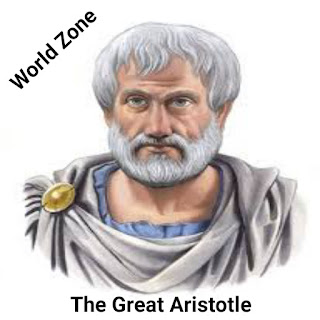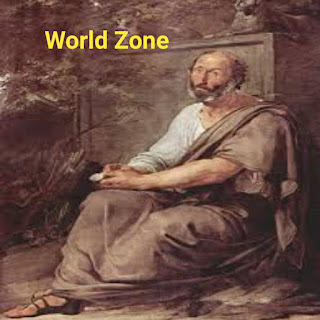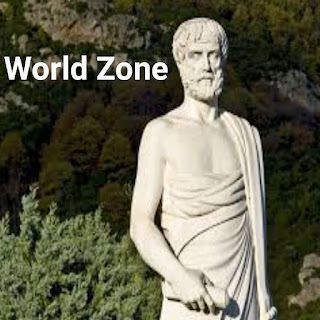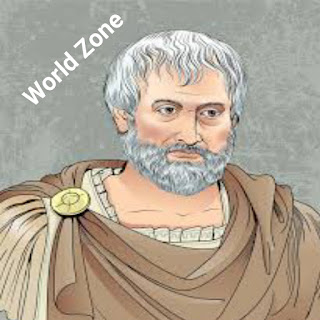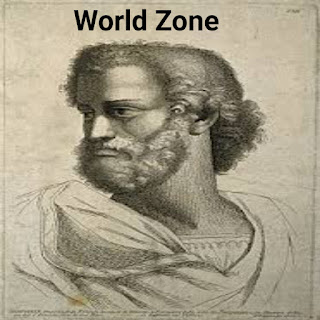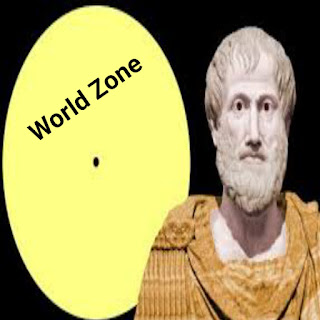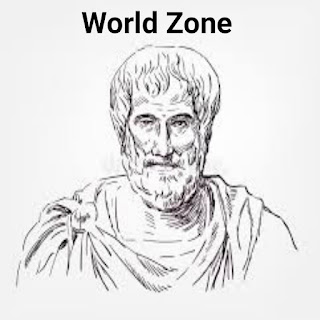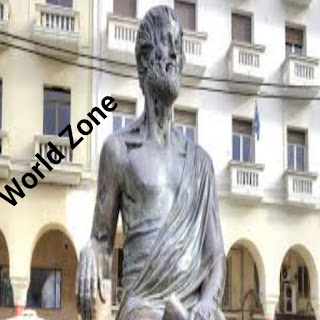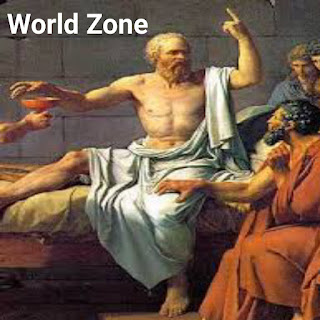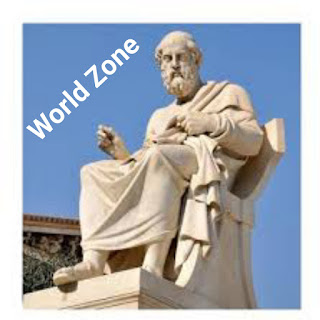Greek Philosopher Aristotle
Greek Philosopher Aristotle
Aristotle, Greek Aristoteles, (considered 384 BCE, Stagira, Chalcidice, Greece — passed on 322, Chalcis, Euboea), old Greek scholar and scientist, one of the most amazing taught figures of Western history. He was the maker of a philosophical and coherent system that transformed into the design and vehicle for both Christian Scholasticism and middle age Islamic perspective. Without a doubt, even after the insightful disturbances of the Renaissance, the Reformation, and the Enlightenment, Aristotelian thoughts remained embedded in Western thinking.
Exceptional Works: "Classes" "Eudemian Ethics" "History of Animals" "Metaphysica" "Nicomachean Ethics" "Recognition for Virtue" "On Generation and Corruption" "On Interpretation" "On the Generation of Animals" "On the Heavens" "On the Parts of Animals" "On the Soul" "Organon" "Actual science" "Poetics" "Administrative issues" "Back Analytics" "Prior Analytics" "Protrepticus" "Way of speaking" "Sophistical Refutations" "Subjects"
Subjects Of Study: Zoology grouping contention approach to talking teleology
Aristotle's insightful reach was tremendous, covering most of specialized disciplines and a critical number of human articulation, including science, natural science, science, ethics, history, reasoning, introspective philosophy, way of talking, thinking of mind, thinking of science, actual science, poetics, political speculation, cerebrum exploration, and zoology. He was the coordinator behind legitimate reasoning, preparing for it a finished structure that for a seriously lengthy timespan was seen as how much the discipline; and he led the examination of zoology, both observational and speculative, in which a piece of his work remained fabulous until the nineteenth 100 years. Nevertheless, he is, clearly, most uncommon as a rationalist. His organizations in ethics and political speculation as well as in otherworldliness and the perspective of science continue to be considered, and his work remains serious areas of strength for an in contemporary philosophical conversation.
Life
The Academy
Aristotle was brought into the world on the Chalcidic expanse of land of Macedonia, in northern Greece. His father, Nicomachus, was the specialist of Amyntas III (managed c. 393-c. 370 BCE), ruler of Macedonia and granddad of Alexander the Great (managed 336-323 BCE). After his father's end in 367, Aristotle moved to Athens, where he joined the Academy of Plato (c. 428-c. 348 BCE). He remained there for a long while as Plato's student and accomplice.
A critical number of Plato's subsequently talked date from these numerous years, and they could reflect Aristotle's responsibilities to philosophical conversation at the Academy. A piece of Aristotle's organizations in like manner have a spot with this period, but by and large they get through in parts. Like his ruler, Aristotle made at first in return design, and his underlying contemplations show serious solid areas for an effect. His talk Eudemus, for example, reflects the Platonic viewpoint on the soul as confined in the body and as prepared for a more euphoric life when the body has been deserted. According to Aristotle, the dead are more respected and more euphoric than the living, and to fail horrendously is to hit one up certified home.
Another youthful work, the Protrepticus ("Exhortation"), has been reproduced by momentum specialists from references in various works from late curio. It would be ideal for everyone to do thinking, Aristotle claims, since fighting against the demonstration of thinking is itself a kind of philosophizing. The best kind of thinking is the thought of the universe of nature; it is consequently that God made individuals and gave them a heavenly insight. All else — strength, greatness, power, and honor — is pointless.
It is possible that two of Aristotle's persevering through manages reasoning and discussion, the Topics and the Sophistical Refutations, have a spot with this early period. The past shows how to foster conflicts for a position one has proactively decided to embrace; the last choice advises the most ideal way to perceive deficiencies in the disputes of others. Yet neither one of the stirs amounts to an exact organization on legitimate reasoning, Aristotle can decently say, close to the completion of the Sophistical Refutations, that he has made the discipline of reasoning — nothing at all existed when he started.
During Aristotle's home at the Academy, King Philip II of Macedonia (administered 359-336 BCE) fought against different Greek city-states. The Athenians safeguarded their opportunity just miserably, and, after a movement of humiliating concessions, they allowed Philip to become, by 338, master of the Greek world. It can't have been a basic opportunity to be a Macedonian tenant in Athens.
Inside the Academy, in any case, relations seem to have remained agreeable. Aristotle for the most part perceived an inconceivable commitment to Plato; he took a huge piece of his philosophical arrangement from Plato, and his instructing is more habitually a change than a repudiation of Plato's lessons. At this point, anyway, Aristotle was beginning to get away from Plato's speculation of Forms, or Ideas (eidos; see structure). (The word Form, when used to imply Forms as Plato thought about them, is a significant part of the time advanced in the wise composition; when used to suggest structures as Aristotle envisioned them, it is expectedly lowercased.) Plato had held that, despite explicit things, there exists a suprasensible space of Forms, which are perpetual and ceaseless. This space, he stayed aware of, makes explicit things clear by addressing their typical characteristics: a thing is a horse, for example, by balance of the way that it participates in, or duplicates, the Form of "Horse." In a lost work, On Ideas, Aristotle stays aware of that the disputes of Plato's central trades spread out only that there are, despite focal points, certain typical objects of specialized disciplines. In his getting through capabilities likewise, Aristotle habitually contradicts the speculation of Forms, on occasion genially and now and again scornfully.In his Metaphysics he fights that the theory forgets to deal with the issues it was planned to address. It doesn't give lucidity on particulars, because extremely durable and endless Forms can't get a handle on how focal points show up and go through change. All the speculation does, according to Aristotle, is available new components identical in number to the substances to be figured out — like one could handle an issue by duplicating it.
Journeys
Right when Plato passed on around 348, his nephew Speusippus became top of the Academy, and Aristotle left Athens. He moved to Assus, a city on the northwestern coastline of Anatolia (in present-day Turkey), where Hermias, an alum of the Academy, was ruler. Aristotle transformed into a dear sidekick of Hermias and over the long haul married his ward Pythias. Aristotle helped Hermias to organize an alliance with Macedonia, which enraged the Persian ruler, who had Hermias beguilingly caught and executed around 341. Aristotle extended regard to Hermias' memory in "Accolade for Virtue," his really getting through work.
While in Assus and during the following very few years when he lived in the city of Mytilene on the island of Lesbos, Aristotle finished expansive sensible investigation, particularly in zoology and ocean life science. This work was summarized in a book later alluded to, misleadingly, as The History of Animals, to which Aristotle added two short creations, On the Parts of Animals and On the Generation of Animals. Regardless of the way that Aristotle didn't actually have laid out the investigation of zoology, his organized impression of a wide collection of living creatures were exceptionally extraordinary. He — or one of his assessment partners — most likely been gifted with astoundingly serious vision, since a piece of the components of bugs that he unequivocally reports were not again seen until the improvement of the amplifying focal point in the seventeenth hundred years.
The degree of Aristotle's legitimate investigation is stunning. A considerable amount of it is stressed over the request for animals into class and species; more than 500 species figure in his organizations, huge quantities of them portrayed comprehensively. The stack things of information about the existence structures, diet, living space, techniques for intercourse, and conceptive systems of vertebrates, reptiles, fish, and bugs are a melange of second assessment and remainders of odd idea. From time to time his incomprehensible stories about charming sorts of fish were shown exact various many years sometime later. In various spots he states evidently and truly a natural issue that necessary hundreds of years to handle, similar to the possibility of beginning phase improvement.
Regardless of an admixture of the magnificent, Aristotle's regular works ought to be seen as a phenomenal achievement. His solicitations were driven in a really coherent soul, and he was reliably ready to concede carelessness where verification was lacking. Whenever there is a conflict among theory and discernment, one ought to accept insight, he requested, and hypotheses are solid furnished that their results change with the saw quirks.
In 343 or 342 Aristotle was accumulated by Philip II to the Macedonian capital at Pella to go about as mentor to Philip's 13-year-old youngster, the future Alexander the Great. Little is had some significant awareness of the substance of Aristotle's direction; but the Rhetoric to Alexander was associated with the Aristotelian corpus for quite a while, it is as of now ordinarily saw as a creation. By 326 Alexander had made himself master of a space that stretched out from the Danube to the Indus and included Libya and Egypt. Old sources report that during his missions Alexander set up for natural guides to be sent off his aide from all bits of Greece and Asia Minor."
Marble bust of Alexander the Great, in the British Museum, London, England. Greek, second first century BC. Expected to be from Alexandria, Egypt. Level: 37 cm.
BRITANNICA QUIZ
Outdated Greece
When was the chief current Olympiad held? Who won the Peloponnesian War? From the city called the "beginning of a vote based framework" to Alexander the Great's beginning stage, examine the universe of old Greece in this test.
ONE GOOD FACT
The essential Europeans to visit Japan were destroyed Portuguese sailors in 1543. Portuguese impact on Japanese society go on in dishes like tempura.
See All Good Facts
In 343 or 342 Aristotle was brought by Philip II to the Macedonian capital at Pella to go about as manual for Philip's 13-year-old kid, the future Alexander the Great. Little is had some significant awareness of the substance of Aristotle's direction; though the Rhetoric to Alexander was associated with the Aristotelian corpus for a seriously prolonged stretch of time, it is as of now ordinarily saw as a cheat. By 326 Alexander had made himself master of a space that reached out from the Danube to the Indus and included Libya and Egypt. Old sources report that during his missions Alexander figured out for normal guides to be sent off his coach from all bits of Greece and Asia Minor.
The Lyceum of Aristotle
While Alexander was vanquishing Asia, Aristotle, by and by 50 years old, was in Athens. Right outside as far as possible, he spread out his own school in an activity room known as the Lyceum. He created a huge library and collected around him a social occasion of impressive assessment students, called "peripatetics" from the name of the house (peripatos) in which they walked and had their discussions. The Lyceum was not a selective home base like the Academy; an enormous number of the discussions there were accessible to the general populace and given in vain.
By far most of Aristotle's persevering through works, with the exception of the zoological pieces, probable have a spot with this resulting Athenian visit. There is no sureness about their consecutive solicitation, and definitely it is conceivable that the major pieces — on material science, enchantment, mind exploration, ethics, and legislative issues — were persistently reexamined and invigorated. Every proposal of Aristotle is productive of considerations and prepared for business, but his piece is typically neither clear nor rich.
Aristotle's works, but not exactly as cleaned as Plato's, are deliberate to such an extent that Plato's never were. Plato's trades shift constantly beginning with one point then onto the following, reliably (as per a state of the art perspective) crossing the cutoff points between different philosophical or consistent disciplines. Undoubtedly, there was no such thing as an insightful discipline until Aristotle prepared the idea during his Lyceum period.
Aristotle segregated the sciences into three sorts: valuable, sensible, and speculative. The valuable sciences, regularly enough, are those that have a thing. They consolidate not simply planning and designing, which have things like frameworks and houses, yet furthermore prepares like method and way of talking, where the thing is something less concrete, similar to win on the battle zone or in the courts. The helpful sciences, most noticeably ethics and administrative issues, are those that guide direct. The speculative sciences — actual science, math, and strict way of thinking — are those that have no thing and no reasonable goal aside from in which information and understanding are searched to bring about some benefit for their own.
During Aristotle's years at the Lyceum, his relationship with his past understudy Alexander obviously cooled. Alexander ended up being progressively more egomaniac, finally pronouncing himself radiant and mentioning that Greeks prostrate themselves before him in worship. Protection from this solicitation was driven by Aristotle's nephew Callisthenes (c. 360-327 BCE), who had been assigned collector of Alexander's Asiatic undertaking on Aristotle's proposition. For his boldness Callisthenes was untrustworthily entangled in a plot and executed.
Right when Alexander kicked the container in 323, vote based Athens became off-kilter for Macedonians, even individuals who were threatening to colonialist. Saying that he didn't wish the city that had executed Socrates "to sin twice against thinking," Aristotle disappeared to Chalcis, where he kicked the pail the following year. His will, which scrapes by, makes shrewd game plan for a tremendous number of mates and wards. To Theophrastus (c. 372-c. 287 BCE), his substitution as top of the Lyceum, he left his library, including his own pieces, which were enormous. Aristotle's persevering through stirs amount to around a million words, but they probably address something like one-fifth of his full scale yield.
Works
Aristotle's works fall into two social affairs: those that were conveyed by him yet are at present transcendently lost, and those that were not anticipated appropriation yet rather were assembled and shielded by others. The chief pack includes essentially of notable works; the resulting gathering contains pieces that Aristotle used in his teaching.
Lost works
The lost works consolidate stanza, letters, and articles as well as talked in the Platonic manner. To conclude by getting through pieces, their substance habitually changed comprehensively from the lessons of the getting through arrangements. The onlooker Alexander of Aphrodisias (imagined c. 200) suggested that Aristotle's works could impart two experiences: an "exoteric" truth for public usage and an "selective" truth put something aside for students in the Lyceum. Most contemporary scientists, regardless, acknowledge that the popular pieces reflect not Aristotle's public points of view but rather a starting period of his insightful development.
Getting through works
The works that have been saved get from unique duplicates left by Aristotle on his destruction. According to old practice — passed on by Plutarch (46-c. 119 CE) and Strabo (c. 64 BCE-23? CE) — crafted by Aristotle and Theophrastus were given to Neleus of Scepsis, whose principal recipients hid them in a cellar to thwart their being seized for the library of the leaders of Pergamum (in present-day Turkey). Subsequently, according to this training, the books were purchased by a finder and taken to Athens, where they were laid hold of by the Roman commandant Sulla when he vanquished the city in 86 BCE. Taken to Rome, they were changed and disseminated there around 60 BCE by Andronicus of Rhodes, the last top of the Lyceum. Though various parts of this story are impossible, it is still comprehensively recognized that Andronicus modified Aristotle's texts and circulated them with the titles and in the construction and solicitation that are unmistakable today.
Development:
Development (kinesis) was for Aristotle a wide term, wrapping changes in a couple of exceptional classes. A perspective of his speculation of development, which solicitations to the indispensable contemplations of truth and likelihood, is close by development, or improvement starting with one spot then onto the next. In case a body X is to move from point A to point B, it ought to have the choice to do in that capacity: when it is at An it is only conceivably at B. Right when this chance has been gotten it, then, X is at B. Anyway, it is then extremely still and not moving. So development from A to B isn't simply the fulfillment of a potential at A for being at B. Is it then a partial acknowledgment of that chance? That will not do either, considering the way that a body fixed at the midpoint among An and B might be said to have somewhat understood that chance. One ought to say that development is an acknowledgment of a likelihood that is at this point being finished. In the Physics Aristotle in this way portrays development as "the truth of what is in likelihood, to the degree that it is in probability."
Development is a continuum: A straightforward series of positions among An and B isn't a development from A to B. If X is to move from A to B, regardless, it ought to go through any center point among An and B. Nonetheless, going through a point isn't identical to being arranged by then. Aristotle fights that whatever is moving has recently been moving. If X, going out from A to B, goes through the moderate point K, it ought to have recently gone through an earlier point J, momentary among An and K. Regardless, yet short the distance among An and J, that additionally is distinguishable, and so on interminably. Whenever at which X is moving, thusly, there will be a past spot where it was by then moving. It follows that there is no such thing as a first snapshot of development.
Death of the Great Aristotle:
With Alexander's assent, Aristotle started his own school in Athens, called the Lyceum. To a great extent, Aristotle consumed a huge piece of the remainder of his life working as a teacher, subject matter expert and writer at the Lyceum in Athens until the death of his past student Alexander the Great.
Aristotle, was seen as a Macedonian ally and was faulted for disagreeableness; he was thusly considered obligated and was sentenced to death. Just before his conviction, and expecting a death penalty, Aristotle purposefully surrendered to the city of Chalcis, where he had a home obtained from his mother.
He passed on to some degree north of the city in 322, of a stomach related fight. He mentioned to be covered near his soul mate, who had kicked the container a couple of years earlier. In his last years he had a relationship with his slave Herpyllis, who bore him Nicomachus, the youngster for whom his phenomenal moral structure is named.

